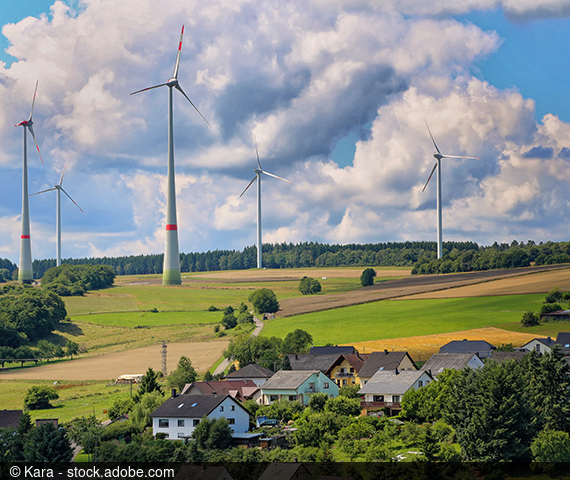Local Support for Renewable Energy Decreases with the Expansion of Wind Power
ResearchCitizens’ preference for green electricity tariffs decreases when a wind turbine is built in their immediate vicinity. This is a central result of a study conducted by ZEW Mannheim together with the French university Mines ParisTech and the University of Mannheim.
“Our results underline how important it is to gain public support for the further expansion of renewable energies. Otherwise Germany will not achieve its climate targets,” summarises ZEW researcher Dr. Robert Germeshausen, one of the authors of the study. In order to curb global climate change, it is necessary to significantly expand the use of renewable energies in the coming years. The success of this strategy depends largely on the acceptance and support of renewable energies among the population. “While opinion polls repeatedly show that there is broad support for renewable energies, concrete projects often meet with fierce resistance at local level, especially when it comes to wind turbines,” says Professor Sven Heim, ZEW Research Associate and co-author of the study.
The ZEW study shows that citizens’ approval drops significantly when a wind turbine is built in their immediate neighbourhood. Among other things, the researchers analyse the effects of wind power expansion on the preference for green electricity tariffs in the corresponding postcode areas. For example, the number of search queries for green electricity tariffs on price comparison websites drops by around 35 per cent when a wind turbine is built in the postcode area. The effect decreases with the distance of the wind turbine from the municipality in question.
Furthermore, the researchers examine the vote share of the Green party as another indicator. For example, the party’s share of the vote in federal elections decreases by about 17 per cent with each new wind turbine built in a municipality. The effect weakens the further away the newly erected turbine is from the municipality in question. This can also be observed in European elections, where the effect is even somewhat greater in absolute terms (around 23 per cent).
However, policymakers can counteract this with appropriate measures. The ZEW study shows that the negative effects of wind energy expansion are locally limited. Accordingly, the researchers find a decreasing negative effect on citizens’ approval the further away the wind farm is from the town or city centre. Legal minimum distances between wind farms and inhabited areas could therefore limit resistance to the expansion of wind energy. The disadvantage, however, is that such regulations significantly narrow the space available for the construction of new wind farms in a country as densely populated as Germany.
In addition, politicians could grant the municipalities in question a financial share of the profits from wind turbines. In addition to a direct (voluntary) profit sharing, e.g. within the framework of the amendment of the Renewable Energy Sources Act (EEG) 2021, profits from wind turbines are subject to local commercial taxation. With the introduction of a special regulation to divide the tax base for wind energy plants between municipalities, the municipalities in which the plant was erected also benefit. The ZEW study suggests that profit sharing could strengthen local support. For example, municipalities that have arguably benefited from the tax reform show lower support losses for renewable energies after a wind turbine is built. The study authors therefore recommend this second option.
The ZEW analysis is based on various data sources, including ene’t, energymap, Acxiom, netztransparenz.de, the Federal Statistical Office, the German National Meteorological Service and the Federal Office for Building and Regional Planning. The researchers examined the development of search queries for green electricity tariffs in the years 2011 to 2014 and evaluated a total of just under 36 million queries. In order to analyse the development of votes for the Green party, the federal elections of 2009 and 2013 were considered.
